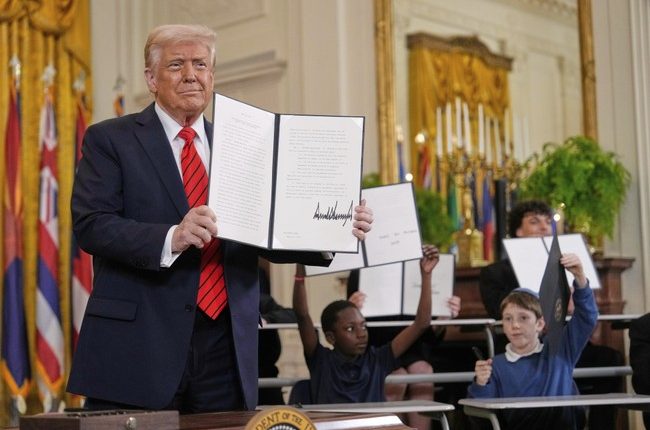
This move makes the war on Harvard look like a brief skirmish.
In fact, Donald Trump’s executive order may moot it altogether by simply bypassing the administration at Harvard and other Academia institutions. Trump has unveiled what he calls his “secret weapon” for transforming higher eduction — an executive order that will transform the federal accreditation process.
And Academia isn’t its only target, either:
President Trump signed an executive order Wednesday to shake up the arcane but pivotal world of college accreditation, a move Trump has called his “secret weapon” in his bid to remake higher education.
The order aims to use the accrediting system to combat what Trump views as discriminatory practices and “ideological overreach” on college campuses, the White House said. The order intends to put a greater focus on intellectual diversity among faculty and student success.
It also would make it easier for schools to switch accreditors and for new accreditors to gain federal approval.
That last part is key to the strategy. The existing accreditor establishment may react much like Harvard’s administration did, by balking at what are common-sense reforms for Harvard and other higher-ed institutions. If the existing accreditors control the market, it will be difficult for Trump to succeed in this mission. By fast-tracking new competitors, however, it will be easier to decertify existing accreditors and to transform the market.
Why is that important? Accreditors are a key gateway to all federal funding:
Accreditors play a role largely unseen to the public but crucial for universities, setting standards that must be met to access federal financial aid. The federal government gave $120.8 billion in loans, grants and work-study funds to more than 9.9 million students in the year ended last September. To earn an accreditor’s seal of approval, higher-education institutions must prove they meet wide-ranging standards covering everything from their mission and admissions policies to the quality of their faculty and programming.
Few schools ever lose their accreditation, even ones with low graduation and job-placement rates.
Trump and other Republicans have long criticized the accreditation process, calling it a cartel that stifles competition and doesn’t help police colleges and universities with poor student outcomes. Accreditors, which must be approved by the federal government, argue they help maintain the integrity of schools and work with those that are struggling.
Some of them have “struggled” for decades. Many of them don’t even produce educated graduates any longer, in part because compulsory education doesn’t produce educated graduates to feed into the schools. Instead, many universities and colleges operate as indoctrination centers for progressive activism, particularly in the ‘humanities.’ They saddle students with massive debt and give them few skills — outside of the true professions — to make it worth repaying. The student-loan crisis is the result of this escalating trend of charging a fortune while delivering poorly.
Frankly, this is a bit of an end run, though one can see why it’s attractive. The better option would be to eliminate all federal funding for higher education altogether — grants, student loans, research funds — and force schools to operate on clear pricing signals and market performance. That path is cleanest and gets the federal government out of education policy altogether, and leaves the enforcement of the Civil Rights Act to the Department of Justice and the courts.
One downside: That option would probably require Congress. But the other downside is obvious and more pertinent: That option would remove any influence Trump has to force Academia to transform itself. As long as Trump controls federal funding to universities and colleges, he can force them to change — one way or another.
Academia isn’t Trump’s only target in this EO, either. This fires a warning shot across the bow of the legal establishment too, via the American Bar Association and its monopoly on accreditation of law schools:
The American Bar Association’s Council of the Section of Legal Education and Admissions to the Bar (Council), which is the sole federally recognized accreditor for Juris Doctor programs, has required law schools to “demonstrate by concrete action a commitment to diversity and inclusion” including by “commit[ting] to having a student body [and faculty] that is diverse with respect to gender, race, and ethnicity.” As the Attorney General has concluded and informed the Council, the discriminatory requirement blatantly violates the Supreme Court’s decision in Students for Fair Admissions, Inc. v. President and Fellows of Harvard College, 600 U.S. 181 (2023). Though the Council subsequently suspended its enforcement while it considers proposed revisions, this standard and similar unlawful mandates must be permanently eradicated. …
(b) The Attorney General and the Secretary of Education shall, as appropriate and consistent with applicable law, investigate and take appropriate action to terminate unlawful discrimination by American law schools that is advanced by the Council, including unlawful “diversity, equity, and inclusion” requirements under the guise of accreditation standards. The Secretary of Education shall also assess whether to suspend or terminate the Council’s status as an accrediting agency under Federal law.
There is similar language targeting the medical establishment, too. Although the EO doesn’t call out the American Medical Association by name, there is also only one accreditor for medical schools in the country, and it’s clearly acting within the AMA’s ambit. The message here is clear — dump DEI in both name and practice, or lose all control of accreditation for the long term.
This may not be the “War’s over, man, Wormer dropped the big one” moment in Trump’s fight with the academic, legal, and medical establishments. But it puts the big one right over the biggest target and makes it clear that Trump really wants to drop it. Some opponents may have Bluto’s reaction, and perhaps some of them don’t even get the joke within it, having been educated in more recent times.









